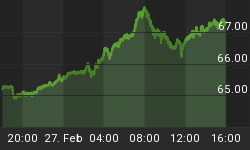There will be no charts today. No speculation about the direction of long term interest rates or markets. No analysis of the push and pull relationship of inflation and deflation, and no discussion about what asset classes are best suited for a given environment.
After reading Mark Rostenko's The Recovery That Isn't & The Bust That Will, I want to reflect on the subject on which I am most qualified, American manufacturing. I appreciate Mr. Rostenko's style of telling it like it is, getting straight to the matter at hand and not sugar coating.
A quote: "We are no longer a nation of producers. America is the world's biggest consumer. When's the last time you saw a new factory being built? Where's our textile industry? Gone. Where's our steel industry? Almost gone. That TV in your house: made in America? Nope. How about the computer? Your appliances? Washing machine? Nope, no way and nada. The automobile industry is on its last legs, as GM's recent news makes abundantly clear. Wave "bye-bye" as soon as the Chinese advance their factories to a competitive level.
We're consumers and borrowers. And that's no formula for wealth. Wealth is built from savings and our savings rate continues to flirt with historical lows. Consumption isn't a bad thing, mind you. But when it's the primary thing, we have a problem."
There is the nut, direct and to the point. On the whole, we certainly are a nation of consumers, and as I have tried to point out in several articles, a nation of consumers who feel entitled to consume as it has become the American way and the American role in the global economy. I have a vantage point as a producer (raw materials such as aluminum or copper metals come into our plant and leave a few weeks later as finished components, assemblies or instruments. It is a microcosm of the most basic function of a healthy economy. A sustainable economy. Unfortunately, I have witnessed over 20 years of degradation of this simple concept. The concept that you sell what you produce. Speaking of which, this just in:
"Stock Futures Slip After Wal-Mart Outlook" (Reuters 8:14 AM, 4/7/05). See what I mean? Our retailing bellwether is a massive conduit for Chinese goods destined for the American consumer. This is the essence of the black hole of consumption that America is sliding into, even as all seems well on the surface. I find it very unsettling that a giant retailer, that imports cheap foreign made goods has reached "bellwether" status for the economy. Now for the ray of hope: The same press release contains a blurb that Alcoa boosted sales due to "higher metals prices and strong industrial demand". The Alcoa news is not all good of course, since the effects of inflation are apparent. It will be interesting to see what percentage of total sales were attributed to American companies that actually produce within American borders (anyone with a little extra time may find it interesting to research this). But I assume Alcoa's American sales grew, so there are still some of us out there, buying raw materials and fashioning them into finished goods that meet actual demand.
Approximately 90% of my company's sales are to the healthcare industry. Medicare plays a large role there. There is some hefty production for the defense sector, with the Pentagon playing the demand role. I would like to think that America's manufacturers have not lost the majority of free market demand in industries like semiconductors and telecom, but that is probably too much to hope for.
Still, when the black hole becomes seen for what it is, when one of the links in the "we inflate our money supply and buy while you arbitrage your labor pool and produce for us" daisy chain breaks, the United States will need an industrial base to fall back on. I am proud that my company is a small, surviving part of that base and look forward to a day when our sector is revalued within the massive papier-mache beast we pretend is a fully functioning economy. Those manufacturers who survive the coming adjustment however, will surely be the ones who have attended to debt and have not levered up into the current and ongoing inflation.
In short, when our currency is exposed as the debt instrument it truly is, on a mass and global scale, the only ones that are going to want to sell to us is us! At least until America addresses and repudiates its current ways of using debt as fuel. The adjustment will be hard, and throughout its duration, the country will need to depend on its own industries. Let's hope they are intact at an acceptable level when the time comes.















